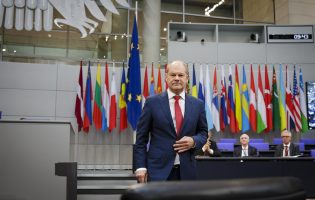AGI News
President Biden: Think Bigger and Broader with Berlin

Official White House Photo by David Lienemann

Stephen F. Szabo
Senior Fellow
Dr. Stephen F. Szabo is a Senior Fellow at AICGS, where he focuses on German foreign and security policies and the new German role in Europe and beyond. Until June 1, he was the Executive Director of the Transatlantic Academy, a Washington, DC, based forum for research and dialogue between scholars, policy experts, and authors from both sides of the Atlantic. Prior to joining the German Marshall Fund in 2007, Dr. Szabo was Interim Dean and Associate Dean for Academic Affairs and taught European Studies at The Paul H. Nitze School of Advanced International Studies, Johns Hopkins University. He served as Professor of National Security Affairs at the National War College, National Defense University (1982-1990). He received his PhD in Political Science from Georgetown University and has been a fellow with the Alexander von Humboldt Stiftung, the Woodrow Wilson International Center for Scholars, and the American Academy in Berlin, as well as serving as Research Director at AICGS. In addition to SAIS, he has taught at the Hertie School of Governance, Georgetown University, George Washington University, and the University of Virginia. He has published widely on European and German politics and foreign policies, including. The Successor Generation: International Perspectives of Postwar Europeans, The Diplomacy of German Unification, Parting Ways: The Crisis in the German-American Relationship, and Germany, Russia and the Rise of Geo-Economics.
Is the United States Germany’s strategic rival? Germany is the fourth-largest economy in the world, a leading liberal democratic power, the core state in the European Union, an active NATO ally, and home to the headquarters of the U.S. military’s European and African commands. Its cooperation is vital to U.S. national interests. Yet U.S.-German relations have deteriorated over the past four years. Last year, even Chancellor Angela Merkel, formerly a champion of close German-U.S. relations, suggested that Germans and their E.U. partners might need to consider the United States as rivals, as they already regard Russia and China. The new U.S. president has an opportunity to revitalize the U.S.-German partnership by thinking bigger and broader about a new series of centerpiece projects. Four areas of possible cooperation in which to promote positive and forward-looking solutions to shared problems are: transatlantic security, trade, public health, and climate change.
Serious tensions between the partners developed during the 2003 American intervention in Iraq and were inflamed again by the 2015 WikiLeaks allegations of NSA spying on the German leadership. President Barack Obama restored trust between the two governments by developing a strong personal relationship with Merkel that helped make Germany the preeminent U.S. partner in Europe.
This article originally appeared in War on the Rocks on November 20, 2020.








